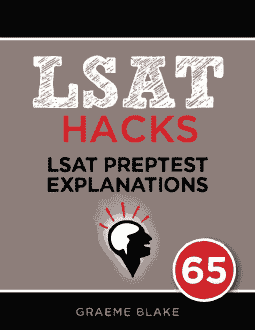QUESTION TEXT: Copyright was originally the grant of a temporary…
QUESTION TYPE: Strengthen
CONCLUSION: Copyright sometimes goes beyond its original purpose.
REASONING: Copyright’s sole purpose is to spread ideas by giving authors a reward from their works.
ANALYSIS: This is an unusual question type. It looks like a ‘complete the argument’ question, but really it’s asking us to strengthen a statement.
We have no idea why copyright might go beyond its original purpose. So you should approach the answers with a clear sense of the original purpose.
The idea behind copyright is to encourage the spread of ideas. Letting authors earn money was the mechanism that allowed ideas to spread. So letting authors earn money is only important if it spreads ideas.
___________
- So? It’s possible there are alternatives to copyright. This doesn’t show that copyright is exceeding its purpose.
- Tempting. But the purpose of copyright is to increase the circulation of ideas. Maybe authors will circulate even more works if they can make money.
- The stimulus ends with ‘sometimes’. It doesn’t matter if authors sometimes can’t find a publisher, as long as they can generally profit from releasing good works.
- Tempting. This would prove that copyright doesn’t work. But we’re trying to prove that copyright goes beyond its purpose. Copyright can’t go beyond its purpose if it doesn’t work.
- CORRECT. If an author is dead, then what good does continued copyright on his works do for him?
Note: This isn’t a great objection to copyright. If your work has value after death, then you can sell it for more money, or leave it to your children. So copyright isn’t necessarily going beyond its purpose if it provides money beyond death. But it might, so this is still the best answer.


I still don’t understand why E is correct. I would quote from an online source that reads, “Copyright is personal property, so the person who created the work could choose whom to pass the ownership of the copyright to… So ownership in a copyright can be passed to an heir or to a third party via a will. ” If so, the financial reward till lingers and serves to benefit her intended beneficiaries.
The key point here is that the stimulus states that “copyright sometimes goes beyond its original purpose”. What’s its original purpose? To let authors get “reasonable financial reward” for their effort. Definitions of what is “reasonable” differ of course, but the word “beyond” signifies that the author feels that copyright has given authors more than what is reasonable. Copyright is supposed to guarantee a financial reward to the author.That can’t apply if you’re dead. People do feel good if they leave money to their heirs, but any returns to their estate earns beyond the grave are not a reward to the original person. Answer Choice E fits: a person getting money when he’s dead and can’t spend it is a bit unreasonable.